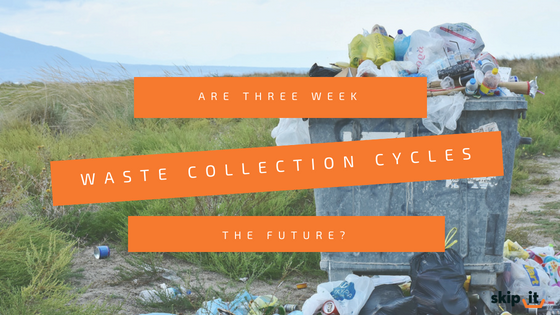Plans to move to three-week black bin waste collection cycles have recently been scuppered by protests from local residents, after Central Bedfordshire council’s recent consultation on the proposed changes. The controversial measures aimed to boost recycling and save £2m worth of public funds.
The plans are on indefinite ‘hold’ in Bedfordshire – but that doesn’t mean that other local authorities won’t seek to follow suit. But is this the best way of increasing local recycling rates? Or is it simply a money saving tactic from a cash-strapped council with a clever PR spin? We looked into the details.
Waste collection in Bedfordshire
The local authority of Central Bedfordshire recycles 45% of its municipal waste collection, which at last count was just a touch higher than the national averages at 43%. While better than the UK average, Central Bedfordshire’s waste collection recycling rates are actually slightly lower than the more local regional average of 46%.
Waste collection in Central Bedfordshire isn’t exceptional by UK standards – but it’s also noticeably better than a lot of councils, particularly those in London.
Are three week waste collection cycles a good idea?
It’s possible that these measures sought to boost recycling rates as well as to save money. In reality, it’d be difficult for anyone to say either way. Whether or not it’s a good idea is another thing entirely.
Collecting non-recyclable waste every three weeks would likely increase recycling rates at least somewhat – as residents would be more careful about disposing of recyclable items in black bins with less space. However, it’s difficult at this point to tell exactly how effective the measure would be.
Most reasonable people would probably be willing to go through a certain amount of inconvenience to increase recycling rates – particularly after awareness has skyrocketed this year. But it’s incumbent upon councils and governments everywhere to ensure this inconvenience has tangible effects and results – and that it’s more effective than other potential solutions.
What else could local councils do to improve waste collection recycling rates?
Recent studies show that local residents think they recycle a whole lot more than actual rates suggest is the case. This is probably due to a bit of good old-fashioned exaggeration – but the fact that comparatively little waste is actually recyclable in the first place probably has a lot to do with it.
If there’s physically too much non-recyclable waste out there to last the average resident three weeks, then extending the waste collection cycle is unlikely to make any tangible difference.
In the long run, transitioning to longer cycles for non-recyclable waste collection is certainly a good idea. But ensuring that there are enough recyclable alternatives to plug the gap in the meantime is surely more important. Recent measures to reduce single use plastic waste, like those pioneered by the likes of Morrisons, are surely more effective.
And if residents and businesses want to avoid having inconvenient waste collection policies imposed on them by governments, then it’s important for them to start making responsible waste collection decisions before they have the opportunity to do so.
Whatever your waste clearance needs, contact Skip It and be safe in the knowledge that we’ll handle it responsibly.






